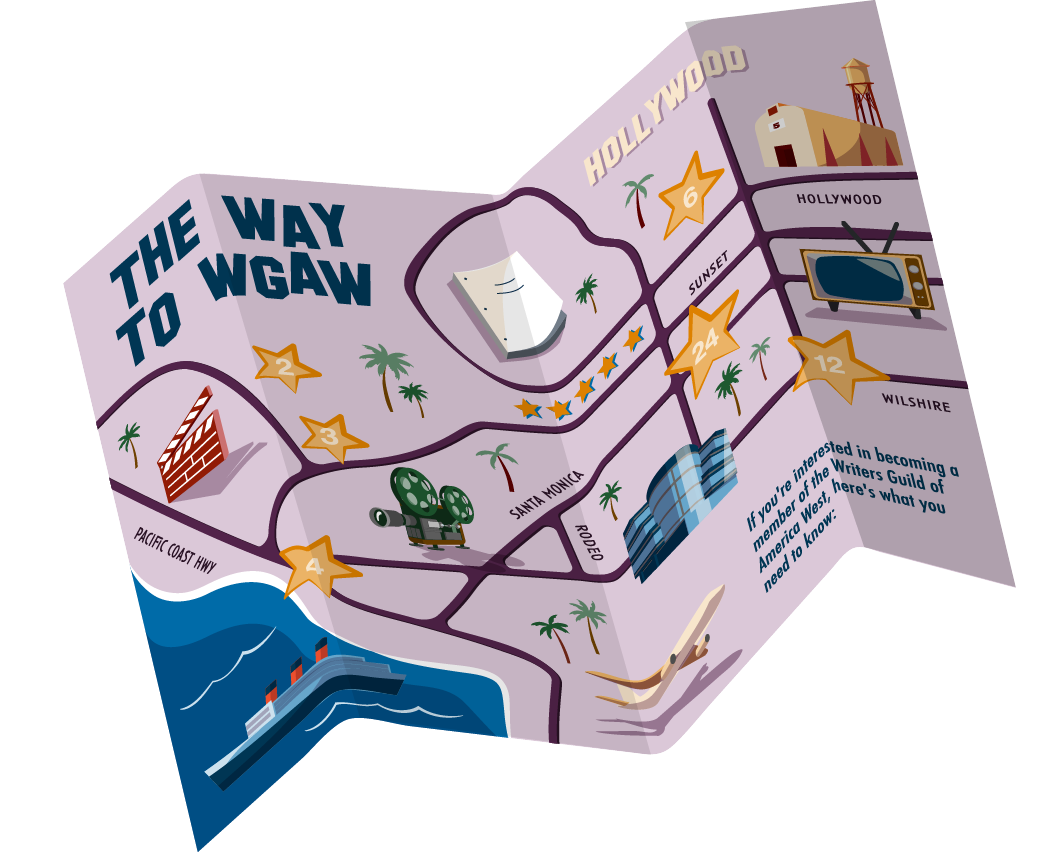Members
Updated March 31, 2021
Separated Rights is one of the most important, and perhaps least understood, areas of the WGA Basic Agreement. Due to the importance of Separated Rights, it is imperative that writers know and understand what these rights are and how they are obtained. As these are complex provisions, please read the entire guide and consult your own attorney or representative regarding Separated Rights and related issues. This guide is intended to provide writers with a clear, concise and easy to understand explanation of Separated Rights. This guide is not a substitute for the Guild's Basic Agreement or the applicable Credits Manuals. If you have questions, contact the Contracts Department at (323) 782-4501.
Separated Rights is one of the most important, and perhaps least understood, areas of the WGA Basic Agreement. Due to the importance of Separated Rights, it is imperative that writers know and understand what these rights are and how they are obtained.
The purpose of this guide is to provide writers with a clear, concise, and easy to understand explanation of Separated Rights. This guide is not a substitute for the Basic Agreement or the applicable Credits Manuals.
The WGA can provide guidance in this area. As these are complex provisions, however, please consult your own attorney or representative regarding Separated Rights and related issues.
Separated Rights are a group of rights that the WGA Theatrical and Television Basic Agreement ("MBA") provides to writers of original material.1 They are derived from Copyright, which is a bundle of rights.
The WGA negotiated for certain of the copyright rights to be separated out and conveyed instead to the writer. These are the Separated Rights, which are described below. The specific rights differ for television and for theatrical motion pictures.
1. WHO IS ENTITLED TO THEATRICAL SEPARATED RIGHTS?
Entitlement to Separated Rights is subject to final WGA determination and may not be negotiated in a writer's individual contract.
In order to be entitled to Separated Rights on a theatrical motion picture, a writer must meet the criteria for both "Initial Qualification" and "Final Qualification." [Figure 1]
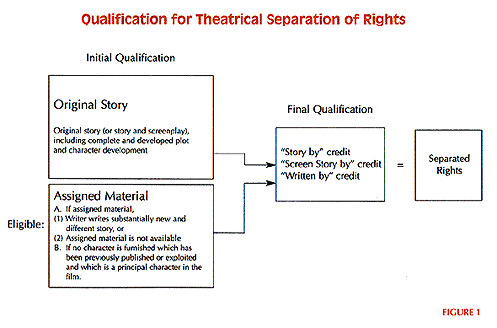
a. Initial Qualification -- A writer is initially qualified for Separated Rights in a theatrical motion picture by writing an original story (or original story and screenplay), including a complete and developed plot and character development. This original story must be written under employment or purchased from a "professional writer." 2 (Article 16.A.2.)
"Original" in this instance means that the material is not based on any material of a story nature that has been previously published or produced, or material acquired outside of WGA jurisdiction. This includes the writer's own material if it has been previously published or produced. The WGA does not cover sales of produced or exploited material. For example, the writer of a produced play who is later employed to write a screenplay based upon the play does not have Separated Rights in the screenplay. Any rights regarding the original play will have to be negotiated separately by the writer.
If the writer is assigned material of a story nature (not simply facts or an idea) from outside of WGA jurisdiction, then the writer still may be entitled to Separated Rights if:
- the writer creates a substantially new and different story, such that there is no longer any substantial similarity between the underlying material and the writer's material, or
- the assigned material is not available to the writer. While that may sound unusual, a prior film may not be available for viewing or a book may be out of print, or the writer may be assigned material not owned by the Company or the Company may not provide the material to the writer.
Although a writer's individual contract may designate an earlier writer's material as "assigned material," material written under WGA jurisdiction is not considered "assigned material" for these purposes. A writer who is not the first writer may still be eligible for separated rights.
b. Final Qualification -- If a writer who is initially qualified for Separated Rights in a theatrical motion picture, as described above, receives "Story by", "Written by" (i.e., story and screenplay credit), or "Screen Story by" credit on the motion picture, the writer is entitled to Separated Rights. (Article 16.A.3.) 3
If a writer is given source material of a story nature but nevertheless believes s/he has created a substantially new and different story, the writer must seek and receive a "Screen Story" credit in order to be eligible for Separated Rights. "Screen Story" credit is accorded when the writer is given source material of a story nature and creates a substantially new and different story. (Article 16.A.3.) Receiving the qualifying credit is known as "Final Qualification." (Article 16.A.2.a.(i), see also Theatrical Schedule A, Paragraph 2.c.)
One further note: A writer who has Separated Rights has Separated Rights in the entire screenplay, even those portions written by other writers. (Article 16.A.4.)
2. WHAT ARE THE THEATRICAL SEPARATED RIGHTS?
The theatrical Separated Rights are publication and dramatic stage rights. Through the MBA, these are licensed back to the writer. [Figure 2]
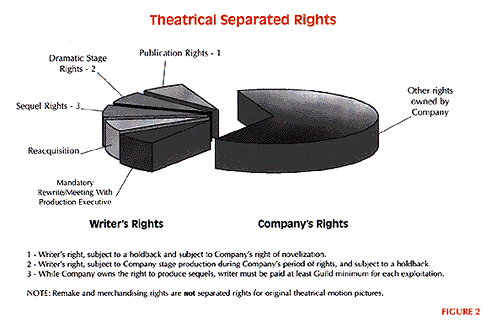
a. Publication rights. The writer obtains the right to publish the script, or book(s) based on the script, subject to a holdback period. The Company, however, has the right to cause a novelization to be published in conjunction with the release of the film, for the purpose of marketing the film. If the Company wishes to cause a novelization to be published, it must first approach the writer(s) who has Separated Rights to see if the writer(s) wants to negotiate with a publisher regarding the rights and services for the novelization. If the writer with Separated Rights does not want to write the novelization or fails to conclude a publishing deal within prescribed timeframes, the Company may publish the novelization but must pay the writer not less than WGA minimum for the right to publish.4 (Article 16.A.3.a.(3))
b. Dramatic stage rights. The writer has the right to produce a stage version of the material after two years following general release of the motion picture if the Company has not exploited the dramatic stage rights. If the material is not produced, the writer may produce a stage version based upon the material 5 years after the date of the contract with the Company. There are certain rules regarding the use of the title of the motion picture. If the Company does exploit the dramatic stage rights, the writer must be paid for such use as provided under the MBA. (Article 16.A.3.b.)
The writer with Separated Rights is also entitled to:
a. Sequel payments.5 The writer must be paid not less than WGA minimum for theatrical motion picture sequels, television movie sequels, or a television series based on the film. (Article 16.A.5.) The writer may negotiate in his/her individual contract regarding such payments, but payments cannot be less than the WGA minimum. In addition, the writer with Separated Rights is entitled to a "Based On Characters Created By" credit on any theatrical sequel and may negotiate for a similar credit on other sequels, including television sequels. (Theatrical Schedule A, Paragraph 2.d.)
b. Mandatory rewrite. The writer who sells or options an original screenplay must be given the opportunity to write the first rewrite at not less than WGA minimum. In addition, if no other writer has been employed, and there is a changed or new element, such as a new director or star which necessitates an additional revision, the writer with Separated Rights must be offered that first additional revision. This right continues for 3 years following the writer's services. (Article 16.A.3.c., Article 16.A.3.d.) The writer may waive this right but such waiver must be negotiated as part of the deal rather than appear as part of the boilerplate language in the Company's form contracts.
c. Meeting with a production executive. If the Company contemplates replacing the writer who has Separated Rights, the writer must first be given the opportunity to meet with a senior production executive who has read the material. Prior to replacing the writer, the Company must discuss with the writer the Company's view and give the writer a reasonable opportunity to discuss continuing to perform services on the project. (Article 16.A.3.c.)
d. Reacquisition. If original material (in the case of reacquisitions, material not based on any pre-existing material) has not been produced within five years, the writer has a two-year window within which to buy back the literary material, and may do so as long as the material is not then in active development. "Active development" includes when a writer is employed on the project and/or when other above-the-line players are employed on a pay-or-play basis. The writer's two-year window starts five years after the completion of the original writer's services or five years from acquisition, whichever is later. That time may be extended if the Company sells or options the material to another company. After the two-year period, the writer's right to reacquire expires under the Separation of Rights provisions, and the writer must negotiate directly with the Company.
In order to reacquire the material, generally, the writer must buy it back from the Company for the amount the writer was paid for the purchase and/or writing services. In addition, the writer must then obligate the "new" buyer to pay the balance of direct literary material costs plus interest on that balance. That amount is due upon commencement of principal photography. Direct literary material costs include those costs directly attributable to the writing such as the first writer's pension and health contributions, costs of other writers, etc. These costs do not include overhead or other costs of production. (Article 16.A.8.) 6
3. WHAT ABOUT REMAKES AND MERCHANDISING?
Although many writers' contracts contain above minimum payments for remakes based on the writer receiving Separated Rights, remake and merchandising are covered in other provisions of the MBA. Writers do not need to receive Separated Rights to be entitled to these payments.
Both a writer who has Separated Rights and a writer who does not have Separated Rights may be entitled to payment for remakes and/or merchandising. For reference, the requirements for theatrical films are as follows:
- Remakes: If the earlier version of the film was written under WGA jurisdiction, then the credited writers of the earlier version are entitled to be listed as participating writers on the remake. As participating writers they are eligible for credit on the remake and may be entitled to additional monies based on the final WGA-determined credits. (Article 13.A.17.)
- Merchandising: The right to merchandise is owned by the Company, and if the Company manufactures and sells an object or thing which is first fully described in the writer's literary material, and by such description such material is unique and original, then the writer must be paid 5% of the monies paid by the manufacturer for such merchandise. (Article 1.B.8.) Therefore, the writer's literary material must physically describe the object or thing being merchandised. For example, if the writer describes a particular kind of communication device in the script with specific physical attributes and if the final product substantially follows that description, the writer may be entitled to money for the sales of the object. The writer may, of course, negotiate for payments for the use of particular characters or objects.
4. HOW DO PRE-EXISTING CHARACTERS AFFECT THESE RIGHTS?
Pre-existing characters may also affect a writer's entitlement to Separated Rights under the following conditions:
- the Company furnishes a character it owns, and
- the character has been previously exploited in a book or a prior film, etc., and
- the furnished character is a principal character in the film.
If all three conditions are met, the writer is not entitled to Separated Rights in the film. (Article 16.A.2.b.)
If the character furnished is a minor character in the final film, then the writer may be entitled to Separated Rights in the screenplay, including the original structure and/or characters the writer creates but not in the pre-existing character. That means the writer may "use" the structure and/or characters created by the writer when writing a book or stage production but may not use the character provided by the Company.
If a principal character comes from a comic book, for example, even though the writer has written an original story using that character and has created new characters, the writer is not entitled to Separated Rights or payments for the further use of any original elements or characters. On the other hand, if that same comic book character appears in a single peripheral scene in the film, the writer may still be entitled to Separated Rights if the other previously mentioned criteria are met.
5. ARE THERE SEPARATED RIGHTS IN A TRUE-LIFE STORY?
A writer may be entitled to Separated Rights in a true-life story depending on what the Company has assigned to the writer.
If the Company gave the writer a specific underlying work on which to base a screenplay with the instructions to follow the structure and point of view of that underlying work, it is likely the writer has not created an original story and would not qualify for Separated Rights.
On the other hand, the Company may give the writer a subject matter (e.g., a real person), and some biographical material, and the writer must determine what story to tell, how to tell it, what tone and point of view to use, and is otherwise given a great deal of discretion so as to create an "original" story. The Separated Rights, if any, would be in the material by the writer, including any new and different characters, characterizations and events. The writer would not gain rights in an individual's life for example; those would need to be acquired separately. (Article 16.A.4.)
In short, in order to protect a writer's separated rights, it is important to establish what material the Company owns, what specific material is assigned to the writer, and to keep a detailed record of all instructions given the writer.
6. WHAT HAPPENS WHEN WRITERS SHARE SEPARATED RIGHTS?
As writers may share the qualifying "Written by," "Story by," or "Screen Story by" credit, they may also share the Separated Rights which flow from that credit.
A team of writers,7 designated with an "&," is considered a single writer and the team members must decide how the rights will be exploited and which of them, if either, will be authorized to exploit the rights on behalf of the team. A written collaboration or partnership agreement is recommended to address these issues before problems arise.
When writers writing separately (i.e., not a team) share the qualifying credit, each writer shares in the rights to the entire story and screenplay. For example, if two writers share "Story by" credit, neither writer owns exclusive rights in what s/he wrote alone. The writers share the rights to the whole property, and, therefore, publication rights and dramatic stage rights must be exploited jointly. (Article 16.A.7.b.)
There are provisions and procedures to make a preliminary determination of separated rights prior to the end of principal photography. (See page 21). If a writer exploits rights based on such a preliminary determination of separation of rights, and a subsequent writer makes significant changes and ultimately shares in the final qualifying credit, the subsequent writer is entitled to share in any proceeds from any exploitation. This is so even if the exploitation is based only on the first writer's material. The amounts due the subsequent writer are determined by the WGA. (Article 16.A.3.a.(3)(ii)(c), Article 16.A.7.b.)
7. What is a Preliminary Determination for Theatrical Separation of Rights8
The MBA provides for a separate and earlier credit determination under the Screen Credits Manual to decide who is entitled to Separated Rights in a film when necessary. (Article 16.A.3.a.3.(ii))
Generally, writing credits are determined immediately following the completion of principal photography and, in the event of a credit arbitration, three independent arbiters are asked to review and compare literary material and determine who is entitled to writing credit on the film. (See Theatrical Schedule A) The Separated Rights are awarded the writer(s) initially qualified for separation of rights who receives the "Written by," "Story by," or "Screen Story by" credit.
If the Company wishes to cause a novelization of a film to be published in conjunction with its release for the purposes of marketing the film, the Company must give the writer(s) with Separated Rights the opportunity to negotiate with publishers for rights and/or services. (See 2.a., above.) This may occur before the film has completed production. In that event, the Company needs to establish which writer has Separated Rights in the film and the WGA must conduct an earlier preliminary credit determination to determine who receives the qualifying credit. (Article 16.A.3.a.(3)) 9
If there is no additional writing on the film following the preliminary determination of Separated Rights, the initial determination becomes final. (Theatrical Schedule A, Paragraph 14) The final writing credit may be affected by additional writing after a preliminary determination of separated rights. Since the writer must also receive the qualifying credit to receive Separated Rights, changes in the script after the preliminary determination of Separated Rights may impact the final entitlement to Separated Rights. This is why all determinations of Separated Rights are subject to final WGA determination and may not be negotiated in a writer's individual contract.
1. WHO IS ENTITLED TO TELEVISION SEPARATED RIGHTS?
On a television movie, the writer who receives "Story by" or "Written by" credit on the program, and, in certain circumstances, "Television Story by," is entitled to Separated Rights. This is determined through the regular credit determination process. (Article 16.B.1.a.)
In the case of an episodic series, the writer who receives "Created by" credit on the series, as determined by the WGA, is entitled to Separated Rights. (See DETERMINING SEPARATED RIGHTS ON A TELEVISION SERIES below.)
Generally, if the series or film is based on source material (e.g., a book or a play), there are no Separated Rights. Some of the exceptions to this general rule are if the source material is factual or the writer has written a substantially new and different story from the underlying material and is entitled to "Television Story by" credit. (Article 16.B.1.b.)
2. WHAT ARE THE TELEVISION SEPARATED RIGHTS?
For original television material,10 there are two categories of rights, each with its own rules and requirements: (1) television rights and (2) all other, otherwise known as "reserved rights." (Article 16.B.2. and Article 16.B.3.) [Figure 3]
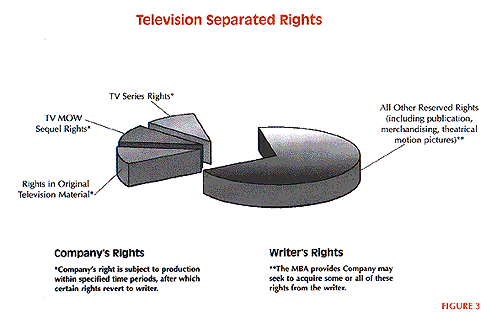
a. Television Rights
(1) Rights in the Original Television Material: When the writer is employed to write an original story (or story and teleplay), or sells original material as a professional writer, the Company has a specified period of time within which it has the exclusive right to produce the material. The material may be a pilot, a Movie of the Week ("MOW")11, or part of an anthology program. The Company generally holds the exclusive right for a period of 4 years from the delivery of the original writer's material.12 For material intended for programs 60 minutes or less, or for topical material (a subject matter of timely interest), that time may be reduced to 30 months following delivery of the material if the material is not in active development at that 30 month mark.
After the Company's period of exclusivity, the writer and the Company share a non-exclusive right to produce the material. This means that both the writer and the Company have the right to produce the property without further obligation to the other, although the Company must still comply with the writer's contract and the MBA. (Article 16.B.2.) It is advised that the writer notify the Company of the intention to exploit the non-exclusive rights.
Beginning with the 1985 MBA, the writer has the right to buy back the Company's non-exclusive right in order to gain exclusivity in the material. The writer may do this by paying back to the Company what was paid the writer. The writer is not obligated to pay any other charges. In addition, the writer must obligate the new production Company to pay any other costs directly attributable to the literary material out of the first revenue after production costs have been recovered. (Article 16.B.2.a.)
(2) Second Pilot: The Company may produce a second pilot during the period it has exclusive rights (either the 30 months or 4 years). If the Company produces a second pilot, it must make a deal with the writer of the first pilot for compensation not less than that paid the writer for the first pilot and in no event less than the current minimum. (Article 16.B.2.a.)
(3) Series Rights: [Figure 4] In addition to the television rights in the original material, the Company has the exclusive right to produce a series based on the original material for the same period described above. This means that the Company must have a commitment to produce and broadcast at least a "short order" of episodes within these time limits. In addition, if the original MOW or pilot is broadcast within three years after delivery of the original material, the Company's exclusive right to produce a series extends to three years from the date of broadcast. If the Company chooses to produce a second pilot, the period of the Company's exclusive right to produce a series is the earlier of four years from delivery of the original material or three years from release of the second pilot.
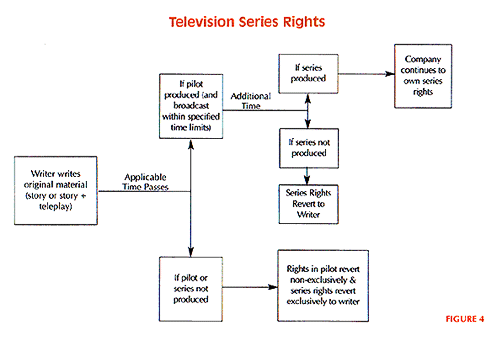
If the Company produces a series within the time frames outlined above, the Company owns the series rights.13 The writers who have Separated Rights are entitled to "sequel payments" for each episode of the series produced as well as residuals on those payments.
If the Company does not produce a series within the time frames outlined above, the sequel rights revert exclusively to the writer. Therefore, after the expiration of the time limits, the writer may sell the series rights to another Company, without any payment to the first Company, even if the first Company has produced a pilot.
In some instances, the writer may write a format or a "bible" for a television program.14 Rights in an unproduced format revert to the writer within 18 months after delivery of the material and rights in an unproduced bible revert to the writer within 24 months, unless the Company has employed another writer to write a story and teleplay based on the format or bible. Certain monies must be paid back to the Company if the format is sold and the series is produced. (Article 16.B.2.a.)
(4) Sequel MOWs: [Figure 5] The rights regarding single sequels to MOWs are very different than for series. These rights generally apply to original material and single production sequels of 90 minutes or more. The writer of the original MOW must be offered the opportunity to write the sequel and there are minimum sequel payments due the writer for each sequel MOW produced.
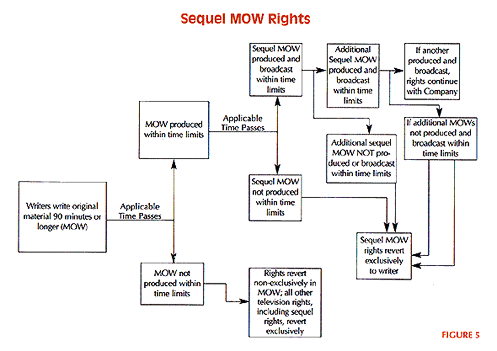
The Company must produce and broadcast sequels within specified periods of time. Each additional sequel extends the Company's right to produce another MOW. If any of the particular timeframes for sequel MOWs are not met, the right to produce additional sequels reverts exclusively to the writer. (Article 16.B.2.b.)
(5) Mandatory Rewrite: When a professional writer sells or options original material 90 minutes or longer, the Company must offer the writer the right to perform the first rewrite at not less than minimum, unless time constraints make that impractical. The writer may waive this right but such waiver must be negotiated as part of the deal rather than appear as part of boilerplate language in the Company's form contracts. (Articles 16.B.3.h. and i.)
In addition, if the Company contemplates replacing the original writer, a representative of the Company is obligated to meet with the writer, which gives the writer an opportunity to discuss staying on the project. (Article 16.B.3.h.)
b. Reserved Rights
Other than those television rights described above, the writer owns all other rights in and to the material. (Article 16.B.3.) The "reserved rights" include the following:
(1) Dramatic stage rights: The right to produce a stage version based upon the material.
(2) Theatrical rights: The right to produce a theatrical motion picture based upon the material.
(3) Publication rights: The right to publish a book based upon the material or to publish the script.
(4) Merchandising rights: The right to manufacture and sell merchandise based upon the material.
(5) Radio rights: The right to produce a radio program based upon the material.
(6) Live television rights: The right to produce a live television program based upon the material.
(7) Interactive Rights: The right to produce interactive programs based upon the material.
(8) All other rights: Other rights now known or known in the future.15
The Company and writer may negotiate for the Company to acquire some or all of the reserved rights. The MBA provides minimums for theatrical, publication, interactive, and merchandising rights. For example, the minimum for the merchandising rights is 6% of the monies paid by the manufacturer for the right to merchandise. However, if the Company does not exploit any of these rights within four years from the delivery of the literary material or three years from the exhibition of the original project, those rights revert to the writer, subject to the Company's limited right of first negotiation. (Article 16.B.3.d.)
Alternatively, if the writer is paid initial compensation in an amount equal to, or in excess of, the "upset price,"16 the Company and the writer may negotiate freely for the Company to acquire all or some of the reserved rights outright." NOTE: The reserved rights must be acquired by the Company in a separate negotiation, in a separate document, and for a separate consideration. (Article 16.B.5.) [Figure 6]
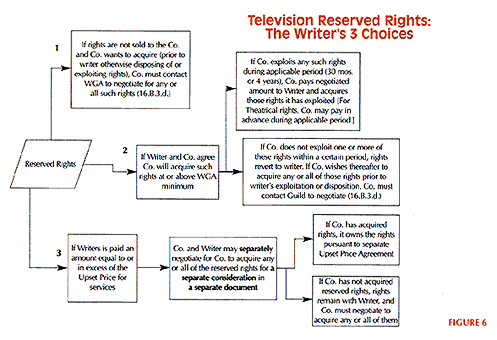
3. WHAT HAPPENS WHEN WRITERS SHARE SEPARATED RIGHTS?
As writers may share the qualifying "Written by," "Story by," or "Television Story by" credit, they may also share the Separated Rights which flow from that credit.
A team of writers,17 designated with an "&," is considered a single writer and the team members must decide how the rights will be exploited and which of them, if either, will be authorized to exploit the rights on behalf of the team. A written collaboration or partnership agreement is recommended to address these issues before problems arise.
When writers writing separately (i.e., not a team) share the qualifying credit, each writer shares in the rights to the entire story and screenplay. For example, if two writers share "Story by" credit, neither writer owns exclusive rights in what s/he wrote alone. The writers share the rights to the whole property, and, therefore, reserved rights must be exploited jointly. (Article 16.B.1.a)
4. WHAT HAPPENS WHEN THERE ARE NO SEPARATED RIGHTS?
If there are no Separated Rights in a series, the credited writer(s) of the pilot is paid 75% of the otherwise due sequel payments, but no residuals. This is known as the ADAPTOR'S ROYALTY. (Article 16.B.6.) The writer may also negotiate for a "Developed by" credit, which is not subject to an automatic credit arbitration.
5. ARE THERE SEPARATED RIGHTS IN A TRUE-LIFE STORY?
A writer may be entitled to Separated Rights in a true-life story, depending on what the Company has assigned to the writer.
If the Company gave the writer a specific underlying work on which to base a teleplay with the instructions to follow the structure and point of view of that underlying work, it is likely the writer has not created an original story and would not qualify for Separated Rights.
On the other hand, the Company may give the writer a subject matter (e.g., a real person), and some biographical material, and the writer must determine what story to tell, how to tell it, what tone and point of view to use, and is otherwise given a great deal of discretion so as to create an "original" story. The Separated Rights, if any, would be in the material by the writer, including any new and different characters, characterizations and events. The writer would not gain rights in an individual's life for example; those would need to be acquired separately. (Article 16.B.3.g.)
In short, in order to protect a writer's separated rights, it is important to establish what material the Company owns, what specific material is assigned to the writer, and to keep a detailed record of all instructions given the writer.
1. "Created by" Credit Determination.
The WGA-determined "Created by" credit also determines the writer's eligibility for separated rights in a series. The "Created by" credit on a series is not determined until there is a series order. There are two ways a writer becomes eligible to seek "Created by" credit on an original series:
- a writer writes a format for the series; or
- a writer r eceives "Story by" or "Written by" credit on the pilot episode of the series.
To determine the "Created by" credit on an original episodic series, there must first be a final determination of credits on the pilot episode of the series.
Generally, if no format has been written for the series, the "Created by" credit will go to the writer(s) who received the "Story by" or "Written by" credit on the pilot. If a format has been written, a Separation of Rights arbitration may be required following the final credit determination on the pilot.
A Separation of Rights arbitration is triggered by a timely protest by an eligible writer of the proposed "Created by" credit on the Notice of Tentative Writing Credits.18
Generally, a Separation of Rights arbitration is conducted in the same manner as all credit arbitrations. Three independent arbiters19 are asked to review and compare the relevant literary material, analyzing the following elements to determine if the second writer(s) have made significant changes from the original material in one or more of the following:
- The framework in which the central running characters will operate and which will be repeated in each episode;
- the setting;
- the theme or point of view;
- the premise or general story line;
- the central running characters;
- the interplay among the characters; and
- the flavor, style or attitude.
A significant change is defined as "a change or additional element that contributes 'significantly' to the series' distinctiveness or viability." The arbiters may award "Created by" credit to the format writer, the pilot writer, or both. The arbiters also determine the percentages in which the writers will share in the Separated Rights. The complete rules for the determination of the "Created by" credit are set forth in the Separation of Rights Manual.
2. WHAT HAPPENS ON SPIN-OFFS?
In the case of a "spin-off" series (a new and different series using one or more of the characters of an established series), a writer is eligible to seek "Created by" credit and Separated Rights in the spin-off series if the writer:
- Receives the "Story by" or "Written by" credit on the pilot of the spin-off series (this is true even if that pilot is produced and exhibited as part of the original series) or,
- Receives the "Story by" or "Written by" credit on the first episode written for the spin-off series in the event there is no pilot, or
- Writes a format leading up to that pilot or first episode.
The MBA does not distinguish between a "planted spin-off" and a "generic spin-off." These terms are generally defined as follows:
- A "generic spin-off" is commonly understood to be a new series that is launched independently of the original series. For example, "Frasier" is a generic spin-off of "Cheers," as the spin-off was launched with the Frasier episode “The Good Son” rather than as an episode of “Cheers.”
- A "planted spin-off" is commonly understood to be a new series in which the new series is introduced as an episode of the original series for the specific purpose of launching the new series. An example of this approach is "Station 19," a planted spin-off of "Grey’s Anatomy," where the main character in the new series, Jaina Lee Ortiz, was introduced in the original series specifically to spin-off into a new series. In other cases, a planted spin-off is used as a set up to establish an existing character from the original series in a new series. An example of this approach is “Private Practice,” another planted spin-off of “Grey’s Anatomy,” in which an episode of “Grey’s Anatomy” is used to allow Addison Montgomery, an existing character in the original series, to travel to the world of the new series.
The final "Created by" credit for the spin-off determines the writer's rights under the MBA.
3. "Developed by" Credit Determination.
Under the MBA, no specific rights attach to the "Developed by" credit. The writer who receives "Developed by" credit does not share in the Separated Rights. Consequently, it is incumbent upon the writer not only to negotiate to be proposed for the "Developed by" credit, but also to negotiate for any royalty or other available right which the parties agree will flow from the credit.
In the case of an original episodic series, a writer who has performed writing services on the program may be eligible for "Developed by" credit under the following circumstances:
- The writer is eligible for, but does not receive "Created by" credit on the series; or
- The writer receives "Teleplay by" credit on the pilot (but not "Story by" or "Written by" credit); or
- The writer has otherwise contributed to the "distinctiveness and viability" of the series.
The Company must agree to propose the writer for "Developed by" credit; neither a writer nor the WGA may independently request the credit if the Company does not propose it. Consequently, it is up to the writer to negotiate with the Company to be proposed for "Developed by" credit in the event the writer does not receive "Created by" credit.
Once the Company has agreed to propose a writer for "Developed by" credit on an original episodic series, it is subject to the automatic arbitration provisions of the MBA.20 Only the writer(s) entitled to "Created by" credit and the writer(s) proposed for "Developed by" credit participate in the "Developed by" arbitration.
The rules for determination of the "Developed by" credit are set forth in the Separation of Rights Manual. Three independent arbiters are asked to review and compare the relevant literary material to determine whether the writer proposed for "Developed by" credit has "contributed significantly to the series' distinctiveness and viability, [though] not enough to warrant a 'Created by' credit." The "Developed by" credit should only be granted "when the use of a 'Created by' credit alone would substantially misrepresent the writer(s) responsible for the series' distinctiveness or viability."
The WGA hopes this guide has answered the questions you may have regarding Separated Rights and the qualification process for Separated Rights. These are complex provisions; please call the Contracts Department (323) 782-4501 if you wish to exploit any of these rights. You may also wish to seek private counsel.
If you have any additional questions, please contact the Guild:
Contracts (323) 782-4501
Credits (323) 782-4528
I. Introduction
In 2000, the Writers Guild of America West published “Understanding Separated Rights” as a guide to the Separated Rights provisions of the Writers Guild of America Theatrical and Television Basic Agreement (“MBA”).1
Since 2000, there have been a few changes to the Separated Rights provisions of the MBA. This addendum is a supplement to “Understanding Separated Rights” and provides more up-to-date information.
II. Writing Teams for both Television and Theatrical
Prior to May of 2001, the MBA did not permit more than two writers to work together as a writing team unless the Guild granted a waiver.
Since May of 2001, the MBA allows for three writers to work together as a writing team without requiring a waiver.
Currently, the MBA does not permit more than three writers to work together as a writing team unless the Guild grants a waiver. Requests for a waiver should come from the writing team and directed to the Guild's Contracts Department at (323) 782-4501 (telephone) or (323) 782-4707 (fax).
The compensation for a team of three writers when all three writers are employed pursuant to Article 14. of the MBA is 150% of the applicable minimum, including the “upset price” in Article 16.B.5.
The compensation for all other teams of three writers is 200% of the applicable minimum, including the “upset price” in Article 16.B.5.
III. Theatrical Separated Rights - Dramatic Stage Rights
Article 16.A.3.b.
The provision, as modified as of May of 2001, gives the Company additional time to exploit the dramatic stage rights. For literary material covered by the 1998 and earlier MBAs, the writer had the right to produce a stage version of the literary material two years after general release of the motion picture, as long as the Company did not exploit the dramatic stage rights within that two-year period.
As of May 2, 2001, the Company has three years after the general release of the motion picture to commence exploitation of the dramatic stage rights. If the Company commences exploitation of the dramatic stage rights within that three-year period, then it has an additional two years (i.e., five years from general release) to stage a bona fide dramatic production.
IV. Theatrical Separated Rights - Reacquisition
Article 16.A.8.d.(1)(a)
In instances where the original writing service or purchase agreement is dated prior to May 2, 2001, writers eligible to reacquire their literary material have a two-year window, immediately following the five (5) year period in which a Company may actively develop the literary material, within which the writer may give a Company notice of his intent to reacquire the literary material. (Article 16.A.8.d.(1)(a))
In instances where the original writing service or purchase agreement is dated on or after May 2, 2001, writers eligible to reacquire their literary material have a five-year window, immediately following the five (5) year period in which a Company may actively develop the literary material, in which to initiate (or trigger) a two-year window within which the writer may give a Company notice of his intent to reacquire the literary material.
The provision, as modified as of May of 2001, gives writers a larger window (five years) in which to initiate the reacquisition process. The actual window in which a writer may reacquire remains the same (two years).
For example, assuming a writer's employment agreement is dated on or after May 2, 2001 and she last delivered literary material in August of 2002, she can give the Company notice of her intent to reacquire as soon as August of 2007 or wait until August of 2012. Once she (or the Guild on her behalf) gives the Company notice, then she can only continue the process for a maximum of two years.
V. Theatrical Separated Rights - Reacquisition of Rewrites
Article 16.A.8.e.
In instances where the original option or option/purchase agreement is dated on or after May 2, 2001, writers eligible to reacquire their literary material have a five-year window, immediately following one year after the expiration of the option, in which to initiate (or trigger) a two-year window within which the writer may give a Company notice of his intent to reacquire revisions of the literary material.
This provision did not exist prior to May of 2001, and is not retroactive. This is an opportunity for a writer to get back revisions, which a Company owns, to a script that the writer owns.
VI. Publication Fee
Article 16.A.10.
The publication fee is found in Article 16. of the MBA, but a writer does not need to have Separated Rights to be entitled to this payment. A one-time fee of $5,000 must be paid in the aggregate to the credited writer(s) of a theatrical motion picture as compensation for the right to publish the screenplay on videodiscs/videocassettes; the compensation is due regardless of whether the screenplay is actually published. The compensation is paid through the Guild's Residuals Department, which can be reached at (323) 782-4700.
VII. Television Separated Rights - Exclusive Series Sequel Rights
Article 16.B.2.a.(2)
To clarify the meaning in the second sentence of the first paragraph on Page 27, the sentence should read:
In addition, if the original MOW or pilot is broadcast within thirty (30) months after delivery of the original material, the Company's exclusive right to produce a series extends to three years from the date of broadcast.
VIII. Television Separated Rights - Holdback Periods
16.B.3.b.
The Company and the writer may negotiate for the Company to acquire some or all of a writer's reserved rights pursuant to either Article 16.B.3.d., 16.B.3.e. or 16.B.5. If a writer does not sell her reserved rights and retains them to exploit herself, there still are applicable holdback periods that must elapse before a writer can exploit particular reserved rights. A writer who is considering selling or exploiting any of their reserved rights should contact the Guild's Contracts Department at (323) 782-4501 for further explanation.
1 “Understanding Separated Rights” and this addendum were never intended to be and are not a substitute for the MBA.
1 These rights apply to original material written under WGA jurisdiction. WGA jurisdiction includes all employment by a signatory Company for writing services and options and/or sales of literary material to a signatory Company by "professional writers" as that term is defined in the MBA. The MBA generally defines a "professional writer" as a person who has received employment for a total of thirteen weeks as a television or theatrical motion picture writer; or received credit as a writer on a television or theatrical motion picture; or received credit for a professionally produced play or a published novel. A person may also negotiate with the Company to be treated as a "professional writer" if s/he does not meet the MBA criteria. Please call the Contracts Department if you have any questions.
2 See footnote 1.
3 If there is assigned material in the writer's contract and the writer receives a qualifying credit, the WGA must assert the material is nonetheless original within a certain number of days following a final determination to retain these rights. Therefore, it is the writer's obligation to contact the WGA promptly if there is assigned material listed in the contract, upon notification by the WGA that the writer may be entitled to Separated Rights.
4 WGA minimum for the right to publish is an advance of $3500 against 35% of monies paid by the publisher, with minor deductions for artwork and the cost of the person doing the novelization.
5 A theatrical motion picture "sequel" is defined as "a theatrical motion picture in which the principal characters of the first theatrical motion picture participate in an entirely new and different story." Each episode of an episodic series and motion pictures based on the original film produced for other mediums (free tv, pay tv, etc.) are also sequels.
6 The writer should consult with the WGA's Contracts Department if the writer is interested in reacquisition of original material intended for a theatrical motion picture.
7 The MBA defines a team as two writers who, prior to employment, offer to work together for approximately the same length of time on the same material. The MBA does not permit more than two writers to work as a team unless the WGA has granted a waiver prior to the commencement of writing services.
8 For information regarding the credit determination process, please review the Screen Credits Manual and the Credits Survival Guide.
9 There may be other instances when the WGA determines which among the writers or whether any writer is entitled to Separated Rights in a particular film.
10 "Original material" in this instance is that which is not based on material previously published or exploited or not based on material written outside of WGA jurisdiction.
11 Long Form television motion pictures were historically called "Movies of the Week" because of their broadcast pattern. More recently, they have been called "Movies for Television" ("MFTs"). The terms are synonymous.
12 To calculate the correct time period, use the date of the original writer's last writing.
13 This includes single programs longer than the typical episode of the series and which are produced separate in time from the production of the rest of the series. (For example, a 2 hour Dallas MOW.)14 The MBA defines a format as follows: "as to a serial or episodic series, such format sets forth the framework within which the central running characters will operate and which framework is intended to be repeated in each episode; the setting, theme, premise, or general story line of the proposed serial or episodic series; and the central running characters which are distinct and identifiable, including detailed characterizations and the interplay of such characters. It may also include one or more suggested story lines for individual episodes." The format for a miniseries is called a "bible." (Article 1.C.19.)X15 These rights are obviously complex. A writer who wishes to exploit any of these rights should first contact the WGA Contracts Department at 323/782-4501. A copy of the writer's contract will also be necessary.
16 The "upset price" is an amount of money, significantly in excess of minimum, set forth in the MBA, that a Company can pay at the time of the original employment or purchase agreement. That allows the Company to negotiate directly with the writer to purchase all or some of the reserved rights. The purchase price for the reserved rights is commissionable.
17 The MBA defines a team as two writers who, prior to employment, offer to work together for approximately the same length of time on the same material. The MBA does not permit more than two writers to work as a team unless the WGA has granted a waiver prior to the commencement of writing services.
18 The writer of the format or the writer with "Story by" or "Written by" credit on the pilot.
19 In the case of Separated Rights arbitrations, the Guild seeks arbiters who have participated in prior "Created by" determinations.
20 The automatic arbitration provisions of the MBA do not apply if the Company proposes "Developed by" credit when there are no separated rights in a series.



